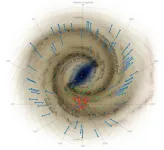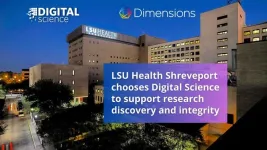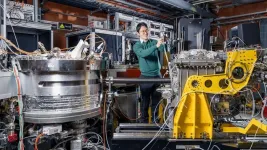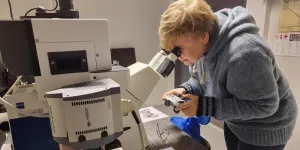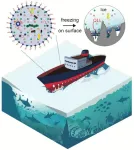(Press-News.org) WASHINGTON – The U.S. Naval Research Laboratory (NRL), in conjunction with the international Fermi Large Area Telescope Collaboration, announce the discovery of nearly 300 gamma ray pulsars in the publication of their Third Catalog of Gamma Ray Pulsars. This milestone comes 15 years since the launch of Fermi in 2008, when there were fewer than ten known gamma-ray pulsars.
“Work on this important catalog has been going on in our group for years,” said Paul Ray, Ph.D., head of the High Energy Astrophysics and Applications Section at NRL. “Our scientists and postdocs have been able to both discover and analyze the timing behavior and spectra of many of these newfound pulsars as part of our quest to further our understanding of these exotic stars that we are able to use as cosmic clocks.”
Pulsars are formed when massive stars have burned though their fuel supply and become unable to resist the inward pull of their own gravity. This results in the star collapsing into a dense, spinning magnetized neutron star. Their spinning magnetic fields send out beams of gamma rays, the most energetic form of light. As these beams sweep across the Earth, the highly sensitive Fermi gamma-ray telescope can observe their periodic pulses of energy. With more than 15 years of data, Fermi has transformed the field of pulsar research.
“We have been very excited about how many millisecond pulsars (MSPs) we have been able to detect using these gamma rays,” said Matthew Kerr, Ph.D., an NRL astrophysicist. “We are able to study these objects that began as young pulsars in a binary system. Like a spinning top, they eventually slowed down and became inert. Over the past hundreds of millions of years, their binary companions dumped matter on to them, causing their speed to increase again, very dramatically and far faster than before, “recycling” these pulsars into MSPs. These high speed MSPs are now some of Nature’s most precise timekeepers.”
Scientists have been using these cosmic clocks in experiments called Pulsar Timing Arrays. By searching for tiny deviations in the times at which the pulses arrive, scientist have been able to search for ripples in spacetime. These ripples, known as gravitational waves, are produced when very massive objects, like pulsars, accelerate very quickly. Very strong gravitational wave sources indicate a cataclysmic crash of dense, compact objects such as neutron stars and black holes.
Recently, several pulsar timing array collaborations, including several NRL researchers, published the first compelling evidence for very low-frequency gravitational waves, likely from the merger of supermassive black holes. “These are such exciting results,” said Thankful Cromartie, Ph.D., a National Research Council Research Associate at NRL. “These low frequency gravitational waves allow us to peer into the centers of massive galaxies and better understand how they were formed.”
The pulsar timing array results have important practical applications as well. The spacetime distortions set a limit on how precisely we can use pulsars for critical navigation and timing. In pulsar-based navigation, these spinning pulsars play much the same role as GPS satellites do, but we are able to use them far beyond the Earth’s orbit. “Now we know where that ultimate stability limit is,” said Dr. Ray.
Using Fermi’s gamma ray detection abilities are also having an impact on pulsar timing array work. “Previously, once we found an MSP we had to hand it off to radio astronomers to monitor with huge telescopes,” said Dr. Kerr. “What we have found is that Fermi is sensitive enough by itself to constrain these gravitational waves and, unlike radio waves, which are bent like the light in a prism as they travel to earth, the gamma rays shoot straight to us. This reduces potential systemic errors in measurements.”
For Megan DeCesar, Ph.D., a George Mason University scientist working at NRL, the most intriguing aspect of the new work in the dramatic increase of “spider” pulsars. “Spider pulsars are named after arachnids that eat their smaller mates,” DeCesar said. “Something similar can happen when a neutron star and its binary companion are very close to each other and the MSP “recycling” process gets a little carried away. The intense radiation and particle wind from the pulsar eats away at the surface of the other star, resulting in a puffball of evaporated material.”
When compared to radio observations, Fermi is particularly adept at finding these “spiders” as, in many cases, radio waves are eclipsed as the pulsar beam passes the remnants of the companion star. Gamma rays, however, are capable of passing right through. “While it may be that spider systems are also intrinsically brighter in gamma rays, studying them will help us to understand their origins and the bonanza of discoveries we have made with Fermi,” said DeCesar.
The Third Catalog of Gamma-Ray Pulsars is published in the Astrophysical Journal, Supplement. This compilation of the latest information on gamma ray pulsars, with its consistent form should prove invaluable to the scientific community.
About the U.S. Naval Research Laboratory
NRL is a scientific and engineering command dedicated to research that drives innovative advances for the U.S. Navy and Marine Corps from the seafloor to space and in the information domain. NRL is located in Washington, D.C. with major field sites in Stennis Space Center, Mississippi; Key West, Florida; Monterey, California, and employs approximately 3,000 civilian scientists, engineers and support personnel.
For more information, contact NRL Corporate Communications at (202) 480-3746 or nrlpao@nrl.navy.mil.
END
A gamma-ray pulsar milestone inspires innovative astrophysics and applications
2023-11-28
ELSE PRESS RELEASES FROM THIS DATE:
Recent scientific studies offer insight into heart and stroke health
2023-11-28
DALLAS, Nov. 28, 2023 — More than 4,000 abstracts were presented during the American Heart Association’s Scientific Sessions 2023 and Resuscitation Science Symposium 2023, held earlier this month in Philadelphia. Here are some of the important scientific findings that could impact your heart and stroke health.
Next wave of AI prediction models aims to predict risk of heart attack and stroke, as well as heart valve disease
Artificial intelligence (AI) and deep learning models may help to predict the risk of cardiovascular disease events and detect heart ...
Montefiore Einstein Comprehensive Cancer Center awarded FDA grant for clinical trial on experimental AML/MDS treatment
2023-11-28
November 28, 2023—(BRONX, NY)—Acute myeloid leukemia (AML) and myelodysplastic syndromes (MDS)—two related blood diseases that disproportionally strike older adults—are notoriously difficult to treat and associated with high relapse rates. Although new therapies have improved survival, treatment options remain limited, and the prognosis for the 50% of people who experience disease relapse remains poor.
Researchers at the National Cancer Institute-designated Montefiore Einstein Comprehensive ...
LSU Health Shreveport chooses Digital Science to support research discovery and integrity
2023-11-28
Digital Science, a technology company serving stakeholders across the research ecosystem, is pleased to announce that Louisiana State University Health Shreveport (LSUHS) has chosen Dimensions Analytics and Dimensions Research Security from Digital Science’s flagship products to advance its world-class research programs.
LSUHS is one of the first customers to subscribe to the new Dimensions Research Security app. The institution – one of the leading health science research programs in the U.S. – has signed a three-year deal to utilize the two products ...
Understanding the impact of transferring patients with dementia between hospitals
2023-11-28
INDIANAPOLIS – It is common for individuals seeking medical care for symptoms of concern to go to the nearest hospital. Physicians there may determine the facility cannot provide the care they believe the patient needs and recommend transfer to another hospital offering a higher level of care or specialized services.
In a recent study, researchers from Regenstrief Institute and Indiana University School of Medicine reviewed electronic health records to compare older adults with dementia transferred to another hospital with older adults who did not have dementia. The researchers found significant differences in treatment following transfer.
Patients with dementia more ...
The secret life of an electromagnon
2023-11-28
Scientists have revealed how lattice vibrations and spins talk to each other in a hybrid excitation known as an electromagnon. To achieve this, they used a unique combination of experiments at the X-ray free electron laser SwissFEL. Understanding this fundamental process at the atomic level opens the door to ultrafast control of magnetism with light.
Within the atomic lattice of a solid, particles and their various properties cooperate in wave like motions known as collective excitations. When atoms in a lattice jiggle together, the collective excitation is known as a phonon. Similarly, when the atomic spins - the magnetisation of the atoms -move together, it’s ...
New method identifies bacteria more easily
2023-11-28
Far too many antibiotics are used around the world. As a result, bacteria are becoming resistant.
Curing bacterial diseases is becoming more difficult than before, because antibiotics are perhaps our foremost weapons in the fight against them.
An important step towards using fewer antibiotics is to find better methods for identifying pathogens, and here is the good news.
“We have developed a simple tool that can identify all of the genetic material in bacteria. This allows us to find out more quickly what kind of bacteria a sick person or animal is affected ...
Bidding adieu to sticky ice, but with a grain of salt
2023-11-28
As Americans gear up for winter, many will face one of their toughest foes: ice. From delaying flights to making roads slippery, ice accumulation on surfaces wreaks havoc in many ways.
But not all ice is created equal. In new research from the University of Illinois Chicago, scientists studied the stickiness of ice containing everyday contaminants such as salt, soap and alcohol. Most laboratory studies typically test ice made from pure water, but in nature, ice is seldom pure.
“Be it dirty sidewalks or the hull of ...
CHOP researchers define seizure burden, developmental outcomes for STXBP1-related disorders
2023-11-28
Philadelphia, November 28, 2023 – Researchers from Children’s Hospital of Philadelphia (CHOP) found that seizure patterns and response to treatment strategies were able to help clinical teams determine epilepsy and developmental trajectories for patients with STXBP1-related disorders, one of the most common genetic epilepsy disorders. The findings were published online by the journal Brain.
Disease-causing variants in the gene STXBP1 are implicated in one of the most common genetic epilepsies and neurodevelopmental disorders, which are sometimes accompanied by autism spectrum disorder, increased or decreased muscle tone, or movement disorders. ...
Researchers identify three genes associated with neurodevelopmental disorders
2023-11-28
An international study group led by researchers of Children’s Hospital of Philadelphia (CHOP) have identified how three novel genes cause neurodevelopmental disorders. Researchers now have a better sense of the genes’ roles in human brain development and function and their ability to serve as potential therapeutic targets in the future. The findings were recently published online by the Journal of Clinical Investigation.
Over the last couple of decades, researchers have identified more than 1500 genes in different signaling pathways associated ...
Miss America’s Scholarship Foundation joins Go Red for Women to champion women’s health and well-being at every age
2023-11-28
DALLAS, November 28, 2023 — Cardiovascular disease (CVD) claims more lives than all forms of cancer, yet many women, particularly younger women, remain unaware.[1] Through its Go Red for Women® movement, the American Heart Association, which is devoted to a world of healthier lives for all, is being supported by Miss America’s Scholarship Foundation to empower the next generation of women to take charge of their health and make a lasting impact on the health and well-being of communities nationwide.
The ...
